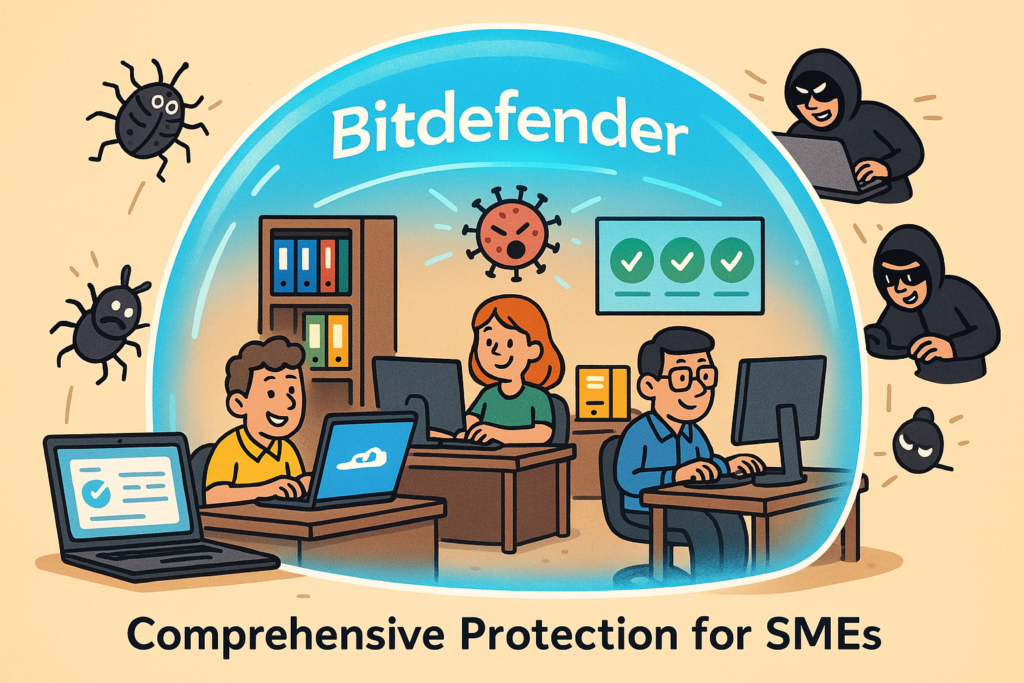Cybersecurity Audits for SMEs
Regular cybersecurity audits can prevent costly breaches. This guide explains the essentials of cybersecurity audits, outlines the steps involved, and shares personal insights and expert advice to help you protect your business.
Cybersecurity Threat Landscape for SMEs
SMEs face an increasing number of cyber threats. Hackers often target smaller companies assuming they have fewer defenses. Key points to consider include:
- High Attack Rates: A significant percentage of cyberattacks target small businesses.
- Business-Ending Breaches: Many businesses are forced to close within six months of a serious breach.
- Financial Impacts: Data breaches can cost hundreds of thousands of dollars, not including legal and recovery fees.
- Ransomware Risks: Many SMEs risk being forced to pay ransoms, which may lead to further attacks.
- Reputation Damage: A breach can lead to a loss of customer trust that takes years to rebuild.
Common Vulnerabilities in SMEs
Audits often uncover vulnerabilities that are common in smaller organizations. These include:
- Unpatched Software: Outdated systems that miss critical security updates.
- Weak Authentication: Poor password practices and lack of multi-factor authentication.
- Malware Entry Points: Insufficient email filtering, disabled antivirus software, and excessive user privileges.
- Third-Party Risks: Vulnerabilities in the systems of vendors and cloud service providers.
- Physical Security Gaps: Unsecured devices or areas that allow unauthorized access.
- Policy and Configuration Issues: Missing formal security policies or improperly configured firewalls and access controls.
Leveraging Trusted Solutions for SME Security

While audits are crucial for identifying vulnerabilities, robust cybersecurity solutions can minimize risks on a daily basis. In my experience, investing in a comprehensive security solution is essential. For instance, I recommend considering Bitdefender for your business protection. Their all‑in‑one security suite is designed for SMEs with limited IT staff and provides essential features like:
- Advanced Threat Protection
- AI-Powered Scam and Phishing Defense
- Built-in Password and Identity Protection
- Network and Device Security
- Managed Detection & Response Services
You can learn more and purchase the solution directly through this affiliate link:
https://store.bitdefender.com/affiliate.php?ACCOUNT=BITLATIN&AFFILIATE=232526&PATH=http%3A%2F%2Fwww.bitdefender.com%2Fbusiness%3FAFFILIATE%3D232526
The Cybersecurity Audit Process
A comprehensive cybersecurity audit involves several systematic steps. An organized approach can ensure that every aspect of your IT environment is reviewed. Here’s an ordered list of common audit steps:
- Review Security Policies and Compliance:
Evaluate existing policies, procedures, and compliance requirements (e.g., GDPR, HIPAA, PCI DSS). - Vulnerability Assessment:
Use automated tools to scan networks, systems, and applications for known weaknesses. - Penetration Testing:
Simulate real-world attacks to check how far an intruder might penetrate your defenses. - Infrastructure and Access Review:
Examine network architecture, firewalls, servers, cloud services, databases, and endpoints. - Employee Awareness Testing:
Assess staff knowledge of cybersecurity practices through training records and simulated phishing tests. - Reporting and Recommendations:
Compile a detailed report listing vulnerabilities and providing recommendations for remediation. - Follow-Up and Action Plan:
Develop and implement an action plan to address identified issues and perform follow-up audits as needed.
Case Studies: How Audits Prevent or Mitigate Breaches
Real-world examples illustrate the value of cybersecurity audits. In many cases, audits have uncovered critical weaknesses that, when fixed, averted major incidents. In other cases, the lack of an audit (or ignoring its findings) led to disaster. Here are two telling examples:
- Preventing a School System Breach: In Maryland, state cybersecurity audits of public school districts revealed serious vulnerabilities that were promptly addressed. One 2018 audit found a school network storing sensitive personal data without proper safeguards and an intrusion prevention system with major gaps. Another audit discovered 32 servers exposed to the internet inside a school network, with no internal segmentation – essentially an open door for hackers. These weaknesses were fixed as a direct result of the audits, helping those districts avoid the fate of a neighboring school system that was crippled by a ransomware attack. This case shows how audits act as an early warning system, catching security holes and prompting fixes before an attacker exploits them.
- Lessons from Ignoring Audit Warnings: Conversely, failing to act on audit findings can have dire consequences. A notable example is the 2015 breach of a health insurer. A federal audit had warned of critical security vulnerabilities shortly before the breach occurred. Unfortunately, those issues were not fully remediated in time. The attackers infiltrated the network and the breach went undetected for 8 months, exposing sensitive data of 11 million customers. As a security expert noted, organizations must “regularly bring in outside experts to review their systems for vulnerabilities and then remediate them as quickly as possible.” This case painfully illustrates that an audit’s value depends on following through – audits only prevent breaches if you act on their recommendations.
These examples highlight a common theme: cybersecurity audits shine a light on security weaknesses that organizations might otherwise overlook. Whether it’s a misconfigured server in a school network or out-of-date software in a clinic’s office, audits find the cracks before attackers do. Acting on audit findings – patching that server or updating that software – can literally save a business from a breach. For SMEs with limited IT oversight, this proactive approach is especially critical. It’s far better to learn about a vulnerability from your auditor than from a hacker on the evening news.
Benefits of Regular Cybersecurity Audits
Regular audits offer numerous benefits:
- Early Detection: Identify vulnerabilities before attackers can exploit them.
- Cost Savings: Avoid the high costs of breach recovery, legal fees, and regulatory fines.
- Compliance Assurance: Stay aligned with industry regulations and avoid fines.
- Enhanced Trust: Protect your company’s reputation by showing a commitment to security.
- Operational Resilience: Prepare for incidents with tested backup and recovery plans.
- Improved Security Culture: Increase awareness among employees and ensure continuous improvement.
Audit Frequency and Who Should Conduct Them
- Frequency:
Most experts recommend at least an annual full cybersecurity audit, with additional interim assessments for high‑risk environments or after major system changes. - Who Should Conduct Them:
While internal IT teams can perform routine checks, external auditors bring an unbiased perspective and specialized expertise. A mix of internal and external audits is ideal.
Expert Advice and Personal Insights
Throughout my career, I have observed that the simplest vulnerabilities can lead to the most severe breaches. Here are some personal insights:
- Regular Reviews:
I make it a point to review my own network settings and audit results quarterly. Even if everything seems fine, vulnerabilities can appear overnight. - Employee Training:
Technical measures are only part of the solution. Regular training and awareness programs for staff are as critical as any software patch. - Documentation:
Keep a detailed record of all audits, findings, and remediation steps. This not only helps in future audits but also in demonstrating compliance during regulatory reviews. - Expert Consultation:
When in doubt, consult external experts. Their fresh perspective can often uncover issues that internal teams may overlook.
Key Cybersecurity Statistics
Below is a simple graph that illustrates key statistics related to cyberattacks on SMEs:
This graph represents approximate statistics that underscore the importance of timely cybersecurity measures for SMEs.
Conclusion
Cybersecurity audits are not optional for modern SMEs—they are essential. By systematically reviewing your IT environment and addressing vulnerabilities, you protect your business from financial loss, operational disruption, and damage to your reputation. Regular audits, when combined with a strong security solution and continuous staff training, can make a significant difference.
For anyone looking to implement a robust security framework, consider leveraging comprehensive tools like Bitdefender. With the right blend of internal efforts and expert support, your business can be better prepared against the growing cyber threat landscape.
Stay vigilant and make cybersecurity audits a regular part of your business routine.


